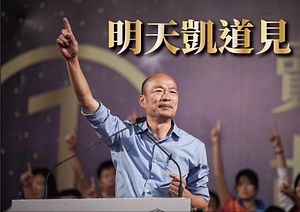Just over one year ago, Kaohsiung Mayor Han Kuo-yu was an ascendant star, soaring in the polls against incumbent President Tsai Ing-wen as TV cameras followed his every move. On Saturday, his political career came to an undignified end as voters removed him from office in a recall election, making him the first elected official to be recalled in Taiwan’s democratic history.
Han’s sudden fall from grace was spurred by local concerns. 939,070 Kaohsiung residents voted in favor of recalling Han – more than the votes Han received when he was elected mayor in November 2018. Many were infuriated by his failure to keep his campaign promises and his decision to seek the Kuomintang (KMT) nomination in the 2020 presidential election despite previously vowing not to do so.
The vote also served as yet another blow for Beijing’s desire to influence the political landscape in Taiwan. Han had been seen as the vanguard of a KMT willing to seek warmer ties with China. But this position has become unpopular among the Taiwanese public, and the KMT’s new leader, Johnny Chiang, has signaled a desire to move away from this policy.
For Kaohsiung, Saturday’s vote ends Han’s brief, tumultuous tenure as mayor. Although Han and the KMT had urged Kaohsiung residents to stay home and not vote, 42.14 percent of residents cast votes in the recall election, easily exceeding the 25 percent turnout and majority vote necessary for a measure to pass under Taiwan’s election laws.
Han said in a Tuesday Facebook post he will not challenge the election results, meaning he will depart office no later than June 12.
Han, who will be barred from running for mayor of Kaohsiung again for four years, added that he plans to take time off after being removed from his position.
Taiwan’s cabinet will be tasked with appointing an interim mayor in Kaohsiung, and a cabinet spokesman said Tuesday it will do so as soon as possible once Han is formally removed.
Kaohsiung will then hold a by-election by September 12; the winner will serve the remainder of Han’s term, scheduled to end in late 2022.
The result comes after months of organizing by Kaohsiung civil society groups affiliated with the “pan-green” camp of the Democratic Progressive Party (DPP), which had held Kaohsiung’s mayoral seat for decades prior to Han’s 2018 victory, and smaller parties such as the Taiwan Statebuilding Party.
Groups including WeCare Kaohsiung, Citizens Mowing Taiwan, and Reset Kaohsiung had organized rallies to recall Han as he embarked on his presidential campaign, which ended in a landslide January defeat to Tsai. In April, the groups reached the petition threshold to trigger a recall election.
Saturday’s turnout, however, came as a surprise and was driven by a deep acrimony toward Han’s job performance as mayor.
Kaohsiung, a longtime DPP stronghold, elected Han in 2018 after he promised to revitalize what he called a stagnant economy. To voters, the populist Han represented a jolt to a political system dominated for years by one party.
His allure quickly began to wear off, however, after he admitted in January 2019 he could deliver on only one of 12 campaign promises he had made before being elected – a list that involved grandiose pledges such as building a Disney theme park in Kaohsiung and inviting Arnold Schwarzenegger to visit the southern city.
Kaohsiung residents might have been willing to give Han a chance, but his gaze quickly turned toward the presidential office in Taipei. Han visited officials in Hong Kong, Macau, and China in March 2019, a trip billed as an opportunity to sell fruits grown in Kaohsiung but seen widely as an advertisement of his promises to jumpstart Taiwan’s economy by relying on trade with China. Han was widely popular at the time as Tsai slumped in the polls.
That changed last summer, however, when Tsai forcefully defended Taiwan’s sovereignty and supported pro-democracy protesters in Hong Kong while Han struggled to elucidate his position on the growing protest movement. Han eventually said he would not accept Beijing’s “one country, two systems” formula in Taiwan, but his momentum waned through the latter half of 2019 and he was routed by Tsai in the presidential election.
By the time Han arrived back in Kaohsiung, he encountered an electorate that felt he had already run out of chances.
Han retains support within the KMT, especially after he showed the ability during his presidential campaign to get scores of voters to attend rallies and become party members. Speculation has mounted Han could launch a bid for KMT party chairperson next May.
On Tuesday, an anonymous KMT lawmaker told Taiwan’s state-run Central News Agency that Han remains the most competitive candidate in any election. Until then, however, the party’s former rising star now finds himself without a job.

































